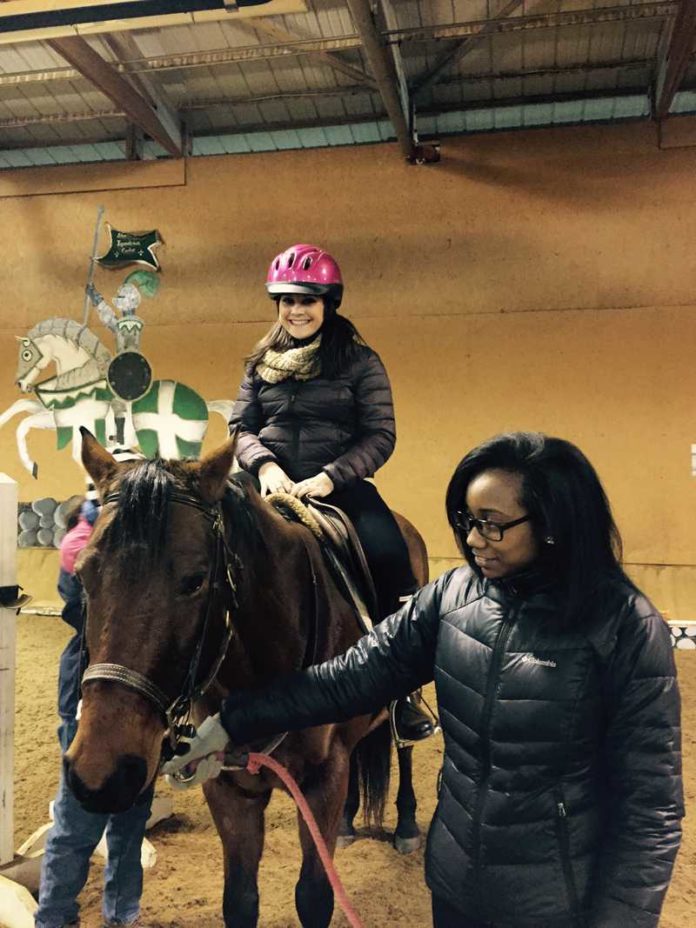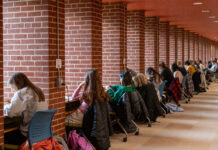Young adults have the opportunity to become more socially and physically active over the course of 10 weeks by participating in aquatics, music and equine-based activities as part of the Therapeutic Recreation: Accessing Independent Leisure and Social Skills (TRAILS) program that gives students the opportunity to work with clients with disabilities.
The TRAILS program specifically caters to individuals with autism spectrum disorders, and helps young adults from the ages of 13 to 21 transition from childhood into adulthood. Statistics from Autism Speaks, which helps to fund the program, has found that one in 68 children are diagnosed with autism, which is up nearly 100 percent in the last decade according to the organization.
Assistant recreational therapy professor, Dr. Betsy Kemeny, serves as the director of TRAILS and oversees the program’s three peer leaders that are getting leadership experience by working with the program and the student volunteers from the recreational therapy services class who are learning the basics of what recreational therapists do and what therapies and interventions they practice. Over the course of the 10 week program, students meet with their clients once a week where they are exposed to new activities.
“Most of the program is at Storm Harbor Equestrian Center and there are beautiful trails around there and we were given a grant to build a sensory trail, which goes along with the trails to transition concept, that we’re helping adolescents with autism move on to adult life,” Kemeny said. “Our focus is also on making sure the recreational therapy students have a sense of the different modalities we use, so I alter what we use like horticulture, equine assisted, music, theater and physical activity.”
The program is focused on helping the clients to accomplish their goals and the modalities are used to help make their hopes a reality. Even more than getting the clients physically active, students are focused on getting the young adults to expand their social skills.
“It’s not just physical activity for physical activity’s sake, we’re actually really focused on the social aspect of it, trying to get the student to talk,” Kemeny said. “Depending on the client, a goal might be to have a verbal exchange with peers three or four times, or if they’re non-verbal it might be that they answer a closed-ended question.”
In order to help fund TRAILS, Kemeny applied for a grant from Autism Speaks which has helped to make programming possible. Both the horticulture and art programs require a lot of supplies for the students to use and certified riding instructors have also been able to participate in the program thanks to the funding that Autism Speaks provided.
Getting money for programming is unusual, but Autism Speaks was able to fund horseback riding, provide music supplies, theater and provide money for art experiences, she said.
Senior recreational therapy major, Lindsay Ramsland, 23, is serving as one of the program’s three peer leaders this semester, and in that role one of her main responsibilities is to plan TRAILS’ weekly session and execute it during their Thursday night meetings. Currently, students are working with their clients at the equestrian center where they are learning how to perform general barn work and become oriented with the horses. Ramsland wanted to become involved with TRAILS to practice the skills that she’s learned inside the classroom in a real life setting and because of the opportunity it presented her to be able to work with adolescents.
“I wanted an opportunity to practice what I’m learning in classes and be able to have my professor help me along as I went through that process,” Ramsland said. “I also love kids so I wanted more opportunities to work with them, which is why I applied to be a peer leader.”
There are nearly 25 students involved with the program that go through different blocks that have them moving to different locations and trying new activities. Clients just completed their aquatics rotation and are now working on their equestrian skills, and are also trying their hand at archery.
“Dr. Kemeny puts the clients into groups based on age and their ability level,” Ramsland said. “We do have one group where we have a client that’s 21 years-old with younger clients so he can work on his leadership skills. Everyone has abilities no matter what, and sometimes I feel like we forget that, but this program shows that everyone can have different abilities no matter what kind of disabilities they have.”
Students from the recreational therapy program will be hosting a hosting a 5K run and a 3K walk on April 16. The fundraiser is meant to raise money for both TRAILS and Autism Speaks so that they’re both able to continue putting on programs for clients that want to expand their social skills and become more physically active.








